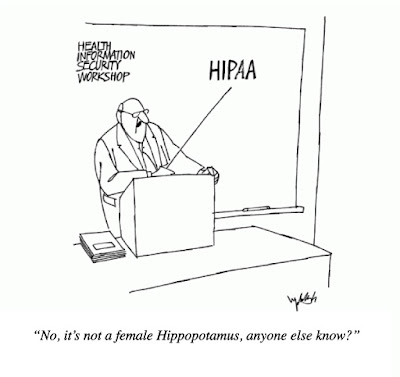Every year, after the craziness of the Holidays, our office
participates in the annual OSHA & HIPAA training seminar hosted by Harris
Biomedical. Thankfully, we don’t have to travel too far as it usually takes
place in the Maggiano’s in Tysons Corner, literally a 5-minute drive from our
office. Harris Biomedical has this seminar every year in the Tysons Corner
area. Look out for their flyers in the mail around the beginning of the year.
Check out their website for more information: http://harrisbiomedical.net/.
The four-hour seminar consisted of a two-hour session
dedicated to OSHA and another two hours dedicated to HIPAA. Breakfast was
included! For those who don’t know what OSHA or HIPAA means, here’s the
breakdown.
The Occupational Safety and Health Act, aka OSHA, are a
collection of regulations that are managed and required in most states,
Virginia being one of them, to guarantee employee safety and good health. OSHA,
or referred in Virginia as VOSH, instructs employers how to provide safe and
healthful working conditions for employees.
The Health Insurance Portability & Accountability Act,
HIPAA, are rules that establish a level of protection for patient private health
information while establishing a balance between the needs of a patient and the
needs of a society. In a nut shell, these rules tell us what we can and what we
can’t do when it comes to patient information.
Let’s start with OSHA. OSHA mandates employers to have
written programs that outline the rules that an employee should follow in order
for the business to run smoothly, safe and accident-free. The Accident
Prevention Program outlines the procedure of how to go about in case of an
accident or emergency such as a fire or if an employee hurts themselves during
work. The Exposure Control Program outlines how an employee should go about
handling different materials in the office in order to eliminate exposure to
bloodborne pathogens. The Hazard Communication Program directs and informs an
employee on how to handle chemicals in the workplace to eliminate exposure to
them. This is just a bit of information regarding OSHA, then let’s move on to
HIPAA.
HIPAA is pretty straight forward: an office is to keep all patient
information safe and out of the hands of unauthorized individuals. All
healthcare offices must prepare and enforce written policies that outline the
HIPAA rules to ensure the protection of patient information. These policies
should also outline the procedure of how to go about if there is a breach. There’s
so much more information! Hopefully the little information we provided will
help you understand a little more about OSHA and HIPAA. If you haven’t done so,
do make the attempt to update or educate yourself and anyone else in the
healthcare world about OSHA and HIPAA.
*Images provided by Harris Biomedical.


Comments
Post a Comment